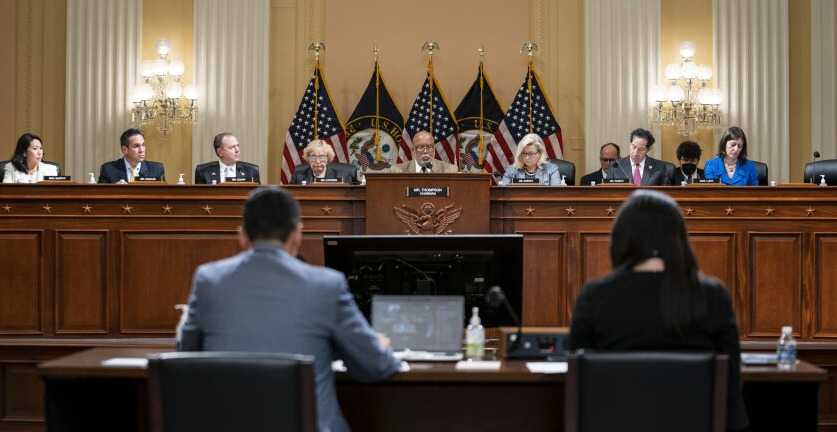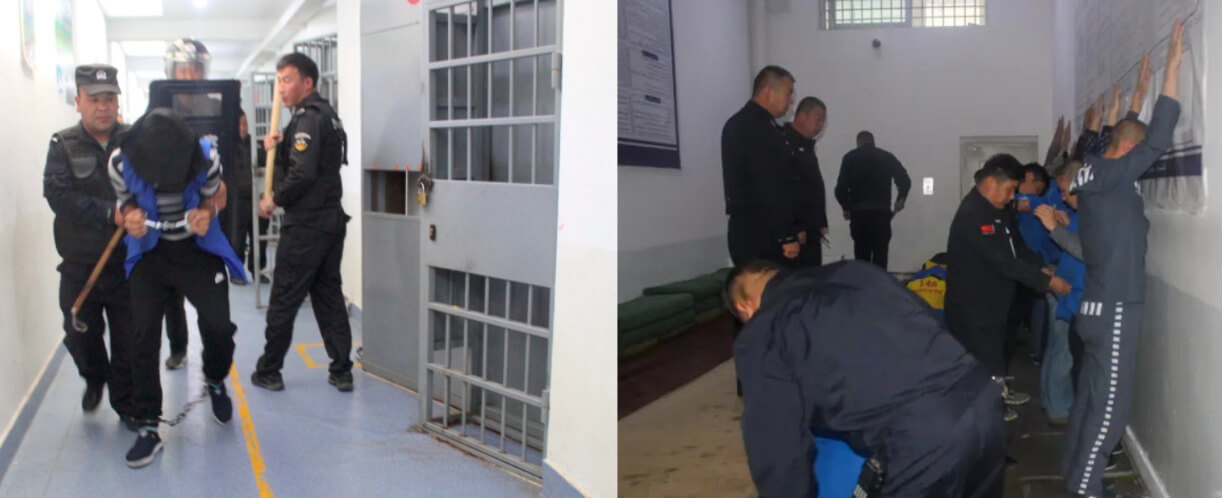The Jan. 6 committee’s first public hearing

Image: Kent Nishimura/LA Times
The House select committee investigating the Jan. 6 riot at the US Capitol held its first of six public hearings in primetime last night.
🏛️ Background: The House formed a committee in late July to investigate the events surrounding Jan. 6, largely via a party-line vote.
- Both parties had initially nominated five members, but Republican leadership withdrew all of their choices after Speaker Nancy Pelosi (D-CA) made a self-professed “unprecedented” decision to veto two GOP reps who had voted against certifying the 2020 election.
- Pelosi ended up nominating all nine committee members, selecting seven Democrats and two Republicans; GOP Reps. Liz Cheney and Adam Kinzinger were both later censured by the RNC for their participation.
- Over the course of its nearly year-long investigation, the Jan. 6 committee interviewed more than 1,000 witnesses and reviewed more than 125,000 documents.
⏩ Fast forward to last night… when the committee aired previously unseen video, audio, and live testimony they allege is proof that former President Trump’s claims of a stolen election incited his followers to try to interrupt the peaceful transfer of power.
📸 The big picture: This week, the DOJ revealed that over 300 people have pleaded guilty to a range of charges related to the events of Jan. 6, with most being misdemeanors; overall, more than 840 defendants have been arrested and ~350 more are still at-large.
👀 Looking ahead… The Jan. 6 committee’s next public hearing is tentatively scheduled for Monday. All five remaining hearings are expected to occur over the next two weeks.
See the 360° View →

Sprinkles from the Left
- Some commentators plead for members of the Jan. 6 committee to clearly and concisely lay the groundwork for reforms and safeguards to our democratic process, and not turn the hearings into a ‘look-at-me’ production aimed at turning America against Trump.
- Others contend the committee should focus on the fact that Jan. 6 was much more than just the riot at the Capitol – it was a months-long campaign to use the resources and agencies of the federal government to overturn the legitimate 2020 election results.
“For the House select committee’s Jan. 6 hearings slated to start Thursday evening to have lasting impact on the American people and lay the groundwork for reforms and safeguards to our democratic process, the committee must stick as closely as possible to journalism’s five Ws and one H: Tell the public the who, what, when, where, why and how of the attack on the U.S. Capitol.
What isn’t needed during the hearings is a sensation-seeking, look-at-us production aimed at capturing and focusing the nation’s attention exclusively on former president Donald Trump and his efforts to overturn the results of the 2020 election.
We need the whole, broader story — built on the facts…
Hyping the upcoming hearings as blockbuster, designating materials as explosive, predicting a captivated viewing audience — all before the gavel falls — is a recipe for losing American eyeballs. The country has been down this road before. Think two Trump impeachment proceedings in the House…
The country needs to know who, both in Washington and beyond, was involved in the events leading up to and including the storming of the Capitol. What were they seeking to achieve? How was the plan hatched, coordinated and, if paid for, how and by whom?...
How did the mob get rolling? Was it planned? Was it spontaneous? Was there more to the attack? And, finally, what was the full, unvarnished role of Donald Trump in an indisputable and ghastly assault on American democracy? And what steps need to be taken to prevent such a dastardly deed from ever happening again?
If it does that, the House select committee will not only have achieved its mission but have earned the nation’s gratitude as well.”
“January 6 marked the first time an American president incited a lethal attack on another branch of government…
The assault on Congress that afternoon represented a desperate and violent attempt to prevent the transfer of power after a months-long campaign to do so had failed. As with Watergate, the campaign was bracing in its scope: using government resources to promote the president’s reelection; soliciting state and local officials to commit election fraud; pressuring the vice president to delay or block the counting of electoral votes; enlisting the Justice Department to sanction the overturning of election results; refusing to officially green-light the operational transition of administrations; devising plans to employ the military to seize ballots and voting machines; strategizing with members of Congress to assemble fake slates of electors; and then inciting a lethal riot at the eleventh hour. After pushing to place a conspiracy theorist at the helm of the Justice Department and advocating for the fake-electors scheme, House Republican Scott Perry texted the White House chief of staff in late December: “Mark, just checking in as time continues to count down. 11 days to 1/6.”
It will be the task of the select committee to pull together the threads of grave misconduct it has exhaustively investigated into a coherent story with an already evident truth at its heart: Despite having lost the election, the former president and his associates embarked on a massive and galling expedition to maintain the presidency at any cost.”

Sprinkles from the Right
- Some commentators on the Right argue the fact that none of the Jan. 6 committee members were appointed by Republicans means the hearings are destined to become a partisan affair with only one perspective shown.
- Others contend that the Left could enact meaningful change by modifying the Electoral Count Act, but decided to host a partisan made-for-TV hearing instead, which some Left-leaning publications are referring to as an “infomercial.”
“Remember that congressional committees, except for the Jan. 6 committee, are made up of members chosen by the leader of the majority… Last July, when Pelosi created the committee, McCarthy nominated five GOP members: Reps. Jim Banks, Jim Jordan, Kelly Armstrong, Rodney Davis, and Troy Nehls. In an unprecedented move, Pelosi vetoed Banks and Jordan, saying, "The unprecedented nature of January 6th demands this unprecedented decision." It was a move that, in the words of Politico, "sent shock waves through the House."
In response, McCarthy withdrew all the Republican nominees. His rationale was that if Pelosi was going to abandon precedent by nixing some opposition party members, then the opposition party was not going to go along with it. So Pelosi appointed the entire committee. The panel's two Republicans, Reps. Liz Cheney and Adam Kinzinger, were appointed by Pelosi. So while it is not accurate to call the committee all-Democratic, it is accurate to say that it is entirely Democratic-appointed.
So what would it be like, what would Thursday night's premiere be like, if there were Republican-appointed Republicans on the committee? The only certain answer is that, unlike now, there would be a difference in perspectives among the members. There would be members to challenge the assertions of other members, who could then respond. There would be differences of emphasis. There would be, in short, the kind of interactions that congressional committees are supposed to have.
Don't look for that to happen.”
“The Capitol riot may be important, and Democrats may be justified in using it to make a political point about Republicans, but that doesn’t mean referring back to the shameful event constitutes news. Barring important new developments, the rioting is already priced into the assessments that midterm voters are making…
If Democrats were actually serious about the events of 1/6/21, they would fix the genuinely disturbing underlying issue, which is the ambiguity of the Electoral Count Act. Instead of doing their job and legislating a fix to protect future elections, though, the politicians are simply leaning on the propagandists to protect their own jobs.
Nobody is actually taking these hearings seriously. The Right obviously isn’t.
As for the Left, it is not treating the hearing as an important means to uncover new information, but rather as a made-for-TV gambit to change the subject away from the many crises associated with Biden administration incompetence. Voters haven’t been thinking about the Capitol riots much because those riots lasted six hours and are over, whereas inflation is ongoing and issues a fresh insult to the wallet every day.
Like Joe Biden, the Democrats think that simply continuing to do things that are not resonating with voters will miraculously steer them away from the election cliff toward which they are heading. They’d be wiser to actually change their terrible policies. But if Democrats had wise ones, they would not be Democrats.”
Share this!
Recent Discussion stories

Discussion
| June 8, 2022The solutions for combating gun violence
🇺🇸 Today, we’re covering various policies and technologies that have been proposed or enacted in recent weeks to curb gun violence in American communities.

Discussion
| June 6, 2022The Xinjiang Police Files
🇨🇳 A human rights group recently published hacked Chinese police files representing one of the most extensive public accounts of Beijing’s treatment of its mostly Muslim Uyghur population.

Discussion
| June 3, 2022What does the future of work look like?
🏢 More than two years after the pandemic first locked down offices, some large companies are closing the door on remote-work accommodations as America slowly shifts toward treating Covid as an endemic disease.
You've made it this far...
Let's make our relationship official, no 💍 or elaborate proposal required. Learn and stay entertained, for free.👇
All of our news is 100% free and you can unsubscribe anytime; the quiz takes ~10 seconds to complete